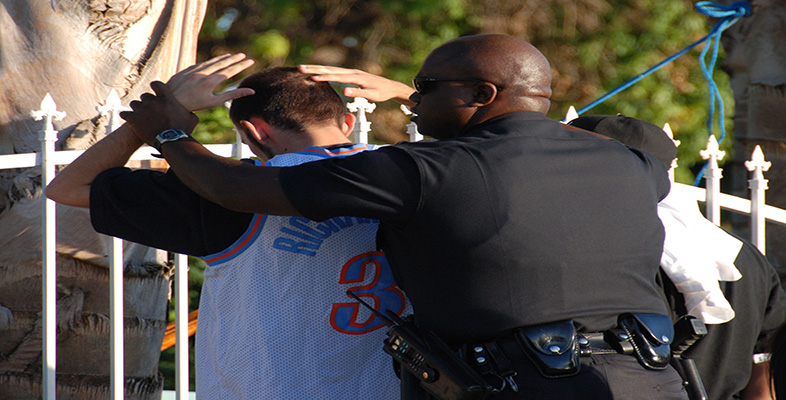Find our more about The Open University's Social Sciences courses and qualifications
Crime is an essentially contested concept. There is no universally agreed definition of what a crime is. However, the most straightforward way of thinking about crime is to look at it in terms of a legalistic perspective - from this approach a crime is an act which is illegal. It’s against the law. Specifically it is against the criminal law. In so doing the act will have certain aspects to it - it will have an aspect of criminal harm and it will have an aspect of criminal blame.
Interestingly though, many people have questioned this legalistic definition. First of all this is because it’s always going to be partial and determined within a very specific and limited set of criteria about what is crime. If a given act isn’t illegal, then whilst we might see it as wrong, or problematic or harmful, it’s not going to be something which will be defined as a crime. Many criminologists have argued that it is important to unpack the legal definition, and have questioned the very notions of what is and what isn’t criminal harm. Criminologists have also questioned notions around criminal blame and both the strengths and weaknesses of a backward looking approach grounded in individual culpability.
Transcript
Mini lecture
What is crime?
David Scott:
A crime is an essentially contested concept. So it’s something where there is no universally agreed definition of what a crime is. However, the most straightforward way of thinking about crime is to look at it in terms of a legalistic perspective and that is, is that a crime is something which is illegal. It’s against the law. It’s against the criminal law and also it will have certain aspects to it. So it will have an aspect of criminal harm and it will have an aspect of criminal blame. Interestingly though, many people have actually questioned this legalistic definition. First of all, because it’s always going to be partial and determined within a very small kind of idea of what is crime. If something isn’t illegal, then albeit we might see it as wrong, or problematic or harmful but it’s not going to actually be something which we can define as a crime. So many people have looked to unpack that legal definition, have questioned the very notions of what is and what isn’t criminal harm and have also questioned notions around criminal blame and both the strengths and weaknesses of that side of things. Some people have even gone as far to say that a crime is a statist category, i.e. that it’s defined by the state and it’s infused with certain interests, ideas and power relations which reflect the interests of the powerful. It reflects the interests of those who have something to lose in society where it does not necessarily reflect the interests of those who are powerless or those at the bottom end of society. Hence, the crime logic is seen as imposed. It’s something which is placed as a category, as a way of generating meanings and understandings and some have argued that that actually is a problem in itself and that we shouldn’t necessarily even think about the logic of crime because actually crime will lead us to certain pathways of solutions, such as punishment.
-End of opinion piece-
A number of criminologists have even gone as far to say that a crime is a statist category, i.e. that it’s defined by the state and it’s infused with certain interests, ideas and power relations which reflect the interests of the powerful. For these critics, the state defined categories of crime reflects the interests of those who have something to lose in society, where as at the same time it does not necessarily reflect the interests of those who are powerless or those at the bottom end of society.
Hence, the crime logic is seen as imposed and perhaps even a reconstruction of reality in legalistic and statist classifications. A crime something which is placed as a specific legal category, as a way of generating meanings and understandings and some criminologists (sometimes referred to as abolitionists) have argued that this is a problem in itself and that we shouldn't necessarily even think about the logic of crime because using the language and logic of crime will lead those who are responding to it down certain pathways which may be considered solutions, such as punishment.
Study a free crime course
-

Race, ethnicity and crime
Learn more to access more details of Race, ethnicity and crimeThis free course, Race, ethnicity and crime, briefly examines the relationships between race and ethnicity, and crime, criminalisation and criminal justice. It considers the relationship between crime and cultural difference; the notion of 'criminalisation' and how its processes affect individuals and their opportunities; and the lived ...
-

The meaning of crime
Learn more to access more details of The meaning of crimeTough on the causes of crime'. A famous phrase, but what is crime? This free course, The meaning of crime, examines how we, as a 'society', define crime. You will look at the fear that is generated within communities and what evidence is available to support claims that are made about crime rates.
-

Criminology beyond crime
Learn more to access more details of Criminology beyond crimeThis free course, Criminology beyond crime, examines the notion of 'social harm' as an alternative to the legal definition of 'crime'. To illustrate this concept, the course considers developments in Green Criminology, which have sought to examine the problems of global environmental harm and the myriad interactions between human beings and the ...
Read more articles on crime
-

Why is the media still fascinated by Brady and Hindley's crimes?
Read now to access more details of Why is the media still fascinated by Brady and Hindley's crimes?Half a century on, the Moors Murders remain a fixed point of fascination and horror for the UK media. Two Manchester-based academics explain why.
-

Psychological drama: Writing fictional crime drama for a forensic psychology course
Read now to access more details of Psychological drama: Writing fictional crime drama for a forensic psychology courseFor Graham Pike, writing psychology courses is part of the job. But what happened when he found himself having to create a crime drama?
Rate and Review
Rate this article
Review this article
Log into OpenLearn to leave reviews and join in the conversation.
Article reviews